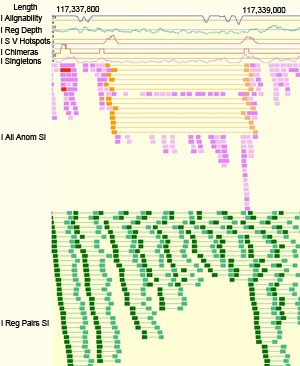Next-generation technology provides human genome sequence

Researchers at the Sanger Institute have announced that a study carried out in collaboration with Illumina scientists has yielded the first complete and publicly available sequence of an African individual human genome. The study, published in Nature, was executed using next-generation Illumina sequencing technologies to sequence the human genome with 99.9 per cent accuracy. The DNA sequenced was taken from the HapMap project and belongs to an individual from the Yoruba of Ibadan, Nigeria.
It is anticipated that advances in individual genome sequencing technologies will allow scientists to identify genetic differences between people that may contribute to differences in health and disease. Using new technologies to sequence the genome, scientists have been able identify 4 million single base changes or single-nucleotide polymorphisms (SNPs) – 26 per cent of which had not been previously identified – and 400 000 larger scale variants in the sequence.
“We have reached the point where we can begin to study individual human genomes routinely at the level of each of their three billion base pairs. The methods we developed for this project can now be applied to develop a deep catalogue of human variation that will underpin the next phase of human genetic research.”
Richard Durbin of the Wellcome Trust Sanger Institute
The 1000 Genomes Project Co-led by Dr Durbin, which launched in January 2008, will sequence the genomes of over 1000 people to discover all human genetic variants that occur at more than 1 per cent frequency.
DNA sequencing projects have historically been carried out using technology that reads around 96 sections of DNA 400-800 base pairs long simultaneously. The sequencing technology used in this study instead reads more than 30 million sections of DNA around 35 base pairs long. These reads are reassembled by mapping them against the Human Genome Project’s reference DNA (NCBI build 36.1), thereby creating an accurate whole genome for the given individual.
For this project the data were collected in only eight weeks and for around $300,000, compared to the eight years and over $300 million for the first human genome sequence produced in 2000.
“It is now possible to economically and efficiently sequence human genomes to discover and profile human genetic variation.”
David Bentley, Vice-President and Chief Scientist of DNA Sequencing at Illumina
The Sanger Institute’s study appears in the same edition of Nature as the first complete genetic sequence of a person of Han Chinese descent, carried out by the Beijing Genomics Institute (BGI) and the first complete genetic sequence of a cancer patient, carried out by Washington University. This is the first time three individual genomes have been simultaneously published in one edition of a journal marking a widespread adoption of high-throughput sequencing technologies to map individual human genomes accurately, economically and widely.
More information
Funding
This research was supported in part by The Wellcome Trust, the Biotechnology and Biological Sciences Research Council, the BBSRC Applied Genomics LINK Programme and the Intramural Research Program of the National Human Genome Research Institute, National Institutes of Health. S. Balasubramanian and D. Klenerman are inventors and founders of Solexa Ltd.
Publications:
Selected websites
The Wellcome Trust Sanger Institute
The Wellcome Trust Sanger Institute, which receives the majority of its funding from the Wellcome Trust, was founded in 1992. The Institute is responsible for the completion of the sequence of approximately one-third of the human genome as well as genomes of model organisms and more than 90 pathogen genomes. In October 2006, new funding was awarded by the Wellcome Trust to exploit the wealth of genome data now available to answer important questions about health and disease.
The Wellcome Trust
The Wellcome Trust is a global charitable foundation dedicated to achieving extraordinary improvements in human and animal health. We support the brightest minds in biomedical research and the medical humanities. Our breadth of support includes public engagement, education and the application of research to improve health. We are independent of both political and commercial interests.


